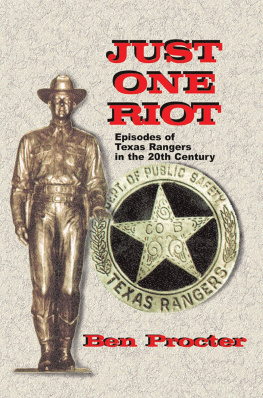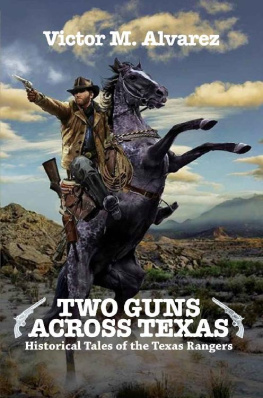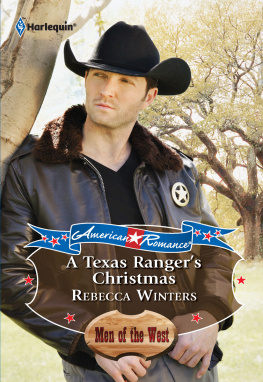Contents
Pagebreaks of the print version


| Copyright 2000 By Ben Proctor Published By Eakin Press An Imprint of Wild Horse Media Group P.O. Box 331779 Fort Worth, Texas 76163 1-817-344-7036 www.EakinPress.com ALL RIGHTS RESERVED 1 2 3 4 5 6 7 8 9 Ebook ISBN: 978-1-68179-206-4 Paperback ISBN 978-1-57168-414-1 |
ALL RIGHTS RESERVED. No part of this book may be reproduced in any form without written permission from the publisher, except for brief passages included in a review appearing in a newspaper or magazine.
Library of Congress Cataloging-in-Publication Data
Procter, Ben H.
Just one riot : Texas Rangers in the 20th century / by Ben Procter p. cm.
Includes bibliographical references (p. )
I. Texas Rangers History 20th century. I. Title.
F391.P94 1991 976.4dc20 | 90-24104 CIP |
To the Hoyts Peggy and Dirk for providing an atmosphere for writing some of these chapters. And to Phoebe Procter, who knows the reason why.
Contents
Foreword
A decade or more ago, much of the time I spent at annual meetings of the Western History Association was occupied in explaining the presence of three historians Donald Worcester, John Alexander Carroll, and Ben Procter to first-time attendees. The trio, all members of the Texas Christian University history department, would sweep through the lobby tall, dressed in flashy Western style (except for Procter), and particularly wearing out-sized Stetsons. No one had to ask whether they came from the state of Texas they looked like Texans, they swaggered like Texans, and they talked like Texans. Procter was the only Texan in the group. Many people wondered whether they were young Texas Rangers (we were all younger then!). They looked like Texas Rangers historically are supposed to look, whereas many Texas Rangers looked like most of us non-noticeable types.
I had only one brush with a Texas Ranger. Del Mar College invited me down to Corpus Christi to give a public talk on the American cowboy. After I finished, a tall straight man, looking as if he might be kin to Worcester, Carroll, and Procter, cornered me and suggested we eat in the campus lunch room. Cowed by his size, I readily assented. He turned out to be Bill Sterling, former adjutant general of the Texas Rangers and author of a better-than-usual autobiography. He talked as if he were yelling into a hurricane, and soon we were surrounded by a gawking and almost adulatory congregation of college students and faculty. Adulatory toward Sterling, not toward me.
Since I had talked about cowboys, he didnt want to talk about Rangers, but about cowboys. A man on horseback, he opined, had to be put on the back of a horse when his bones and shape were still forming. Otherwise he would never make a proper horseman. As a Ranger, he knew. Your two lower cheeks had to lie equally on either side of the horses backbone, like saddlebags, and gradually assume the shape of a horses upper sides and rise and fall in rhythm with the horses flanks.
You take Roy Rogers, Sterling shouted. He makes a million dollars, but you can tell he was born in Ohio or somewhere. He has two little round balls for a behind, and they just bounce along as though he and the horse dont know each other yet! Yet hes been making movies for thirty years or more. Its because he didnt grow up on a horse.
I nodded approvingly, and was glad he couldnt analyze my rhythms on the back of a horse. Our little claque whistled with approval. I wished I were somewhere else.
Walter Webb, frequently quoted in the following book, often told me he wished he could rewrite his landmark book on The Texas Rangers because he had swallowed whole their distrust of anyone who might have crossed the Rio Grande into Texas anywhere in the past 375 years. To a Ranger, he said, anyone with an olive skin, black eyes, black hair, and a hint of a Mexican accent must be guilty of something illegal, preferably murder, robbery, cattle-rustling, or invasion. Webb had listened to the Rangers while he supped with them at night, and had absorbed some of their prejudices into the pages that ensued.
He also liked to tell the story of Frank Hamer, famous for his tracking and ambush of Bonnie and Clyde after his Ranger days. Hamer told Webb that as a young man, barely adult, he had been stationed in San Angelo with the Rangers, his first post. He and another Ranger, equally youthful, devised a plan to hold up the San Angelo bank. They arranged for fresh mounts to be stashed at convenient spots between San Angelo and the Rio Grande, so they could dash like old Pony Express boys across into Mexico before their Ranger buddies could catch up with them.
We never thought of the money, said Hamer. We were young men full of being young, and we just wanted to see if we could pull it off. Most of all, we didnt like the teller in the bank, and we really wanted to see the look of surprise on that s.o.b.s face when we stuck two pistols in his face and told him to reach for the money!
But at the last moment they were ordered out on a look-see at another problem area, and the plans were abandoned. And so the Rangers avoided a scandal, of which few have seen the light. Then Hamer would look off into the distance and say again, But oh how Id have liked to have seen that s.o.b.s face!
The point of these personal notes is to indicate that Rangers were human beings, young and impulsive and careless, as well as, like Sterling, down-to-earth philosophers and observers. The movies and novels have portrayed them as some sort of other-worldly figures, hard-eyed and cold, almost grim and godlike in their search for justice and retribution.
Ben Procters book shows the Texas Rangers as human beings and brings them out of the stern shadows into vivid life. The manuscript reads like a succession of Hollywood or TV action scripts, each chapter focusing on a dramatic incident or a Texas Ranger who will not be faced down, no matter how great the trouble or the guns facing him. I can see half-a-dozen movies being made from this book. The story is there, and Procter has told it vividly. He reminds me of Leander McNellys definition of courage a man who just keeps on coming on. Procter has kept on coming on with this story of the modern Texas Ranger, and its going to be a difficult book to put down. Whether the Rangers have outlived their time is problematical and political, but they will live again through the following pages.
JOE B. FRANTZ
Preface
In 1965 Steve Schuster, a graduate student at Texas Christian University, wrote a masters thesis, under my direction, entitled The Modernization of the Texas Rangers, 1930-1936. His study piqued my curiosity in law enforcement, especially concerning the men who made up the statewide organization. As a result, I encouraged two graduates, James Ward of San Angelo State University and John McClung of Pepperdine University, to do dissertations on the twentieth-century Texas Rangers, and I began conducting taped oral history interviews with the most outstanding and revered Ranger officers. Periodically over the next ten years, I interviewed such men as Red Burton, Leo Bishop, Bob Crowder, Manuel T. Lone Wolf Gonzaullas, A. Y. Allee, Bill Wilson, Clint Peoples, Jim Riddles, Dogie Wright, Trenton Horton, Charlie Miller, and Lewis Rigler, as well as Colonel Wilson Speir and Lieutenant Colonel Leo Gossett, the director and assistant director of the Texas Department of Public Safety. In the summer of 1974, after the hostage crisis at the Huntsville prison, I interviewed a number of participants in that ordeal: Texas Department of Corrections Director Jim Estelle, Ranger Captain G. W. Burks, and hostages Linda Woodman and Novella Pollard. This book is based largely on those taped interviews, together with accompanying evidence from newspapers, memoirs, theses, dissertations, and Ranger scrapbooks and documentary records.








